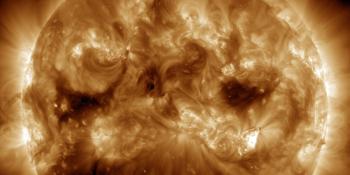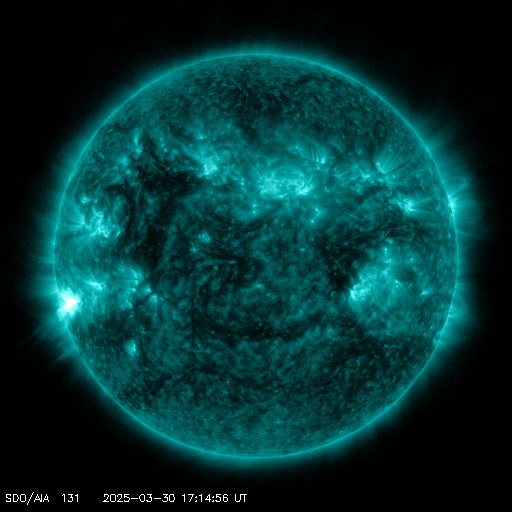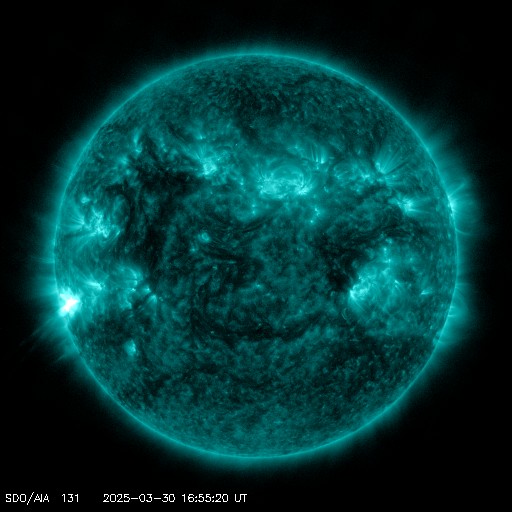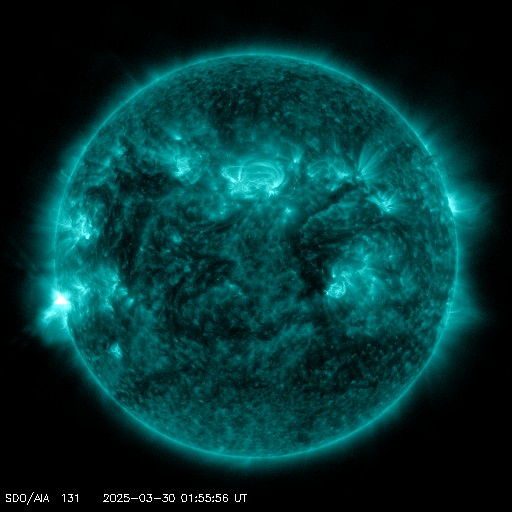Viewing archive of Thursday, 28 March 2024
Solar activity report
Report of Solar-Geophysical Activity 2024 Mar 28 2200 UTCPrepared by the NOAA © SWPC and processed by SpaceWeatherLive.com
Joint USAF/NOAA Report of Solar and Geophysical Activity
SDF Number 88 Issued at 2200Z on 28 Mar 2024IA. Analysis of Solar Active Regions and Activity from 27-2100Z to 28-2100Z
Solar activity has been at high levels for the past 24 hours.
The largest solar event of the period was a X1 event observed at
28/2056Z from Region 3615 (S13W69). There are currently 5 numbered
sunspot regions on the disk.
IB. Solar Activity Forecast
Solar activity is expected to be moderate
with a chance for X-class flares on days one and two (29 Mar, 30 Mar)
and expected to be very low with a chance for a C-class flares on day
three (31 Mar).
IIA. Geophysical Activity Summary 27-2100Z to 28-2100Z
The geomagnetic
field has been at quiet levels for the past 24 hours. Solar wind speed
reached a peak of 865 km/s at 27/2336Z. Electrons greater than 2 MeV at
geosynchronous orbit reached a peak level of 241 pfu.
IIB. Geophysical Activity Forecast
The geomagnetic field is expected
to be at quiet levels on day one (29 Mar) and quiet to unsettled levels
on days two and three (30 Mar, 31 Mar). Protons greater than 10 Mev have
a chance of crossing threshold on day one (29 Mar) and have a slight
chance of crossing threshold on day two (30 Mar).
III. Event Probabilities 29 Mar to 31 Mar
| Class M | 75% | 75% | 05% |
| Class X | 25% | 25% | 01% |
| Proton | 30% | 10% | 05% |
| PCAF | Red | ||
IV. Penticton 10.7 cm Flux
Observed 28 Mar 173 Predicted 29 Mar-31 Mar 175/170/155 90 Day Mean 28 Mar 164
V. Geomagnetic A Indices
Observed Afr/Ap 27 Mar 007/005 Estimated Afr/Ap 28 Mar 005/006 Predicted Afr/Ap 29 Mar-31 Mar 007/008-008/008-009/010
VI. Geomagnetic Activity Probabilities 29 Mar to 31 Mar
| A. Middle Latitudes | |||
|---|---|---|---|
| Active | 20% | 15% | 20% |
| Minor storm | 05% | 05% | 05% |
| Major-severe storm | 01% | 01% | 01% |
| B. High Latitudes | |||
|---|---|---|---|
| Active | 15% | 15% | 15% |
| Minor storm | 30% | 25% | 30% |
| Major-severe storm | 30% | 25% | 30% |
All times in UTC
Current data suggests there is a slight possibility for aurora to appear at the following high latitude regions in the near future
Norilsk, VorkutaLatest news
Latest forum messages
More topicsSupport SpaceWeatherLive.com!
A lot of people come to SpaceWeatherLive to follow the Sun's activity or if there is aurora to be seen, but with more traffic comes higher server costs. Consider a donation if you enjoy SpaceWeatherLive so we can keep the website online!

Latest alerts
17:27 UTC - Solar flare
Moderate M1.5 flare
17:03 UTC - Solar flare
Moderate M1.61 flare
16:45 UTC - Radio Blackout
Minor R1 radio blackout in progress (≥M1 - current: M1.61)
02:09 UTC - Solar flare
Moderate M1.54 flare from sunspot region 4048
01:42 UTC - Radio Blackout
Minor R1 radio blackout in progress (≥M1 - current: M1.24)
Space weather facts
| Last X-flare | 2025/03/28 | X1.1 |
| Last M-flare | 2025/03/30 | M1.4 |
| Last geomagnetic storm | 2025/03/27 | Kp5 (G1) |
| Spotless days | |
|---|---|
| Last spotless day | 2022/06/08 |
| Monthly mean Sunspot Number | |
|---|---|
| February 2025 | 154.6 +17.6 |
| March 2025 | 127.5 -27.1 |
| Last 30 days | 127.5 -24.7 |





